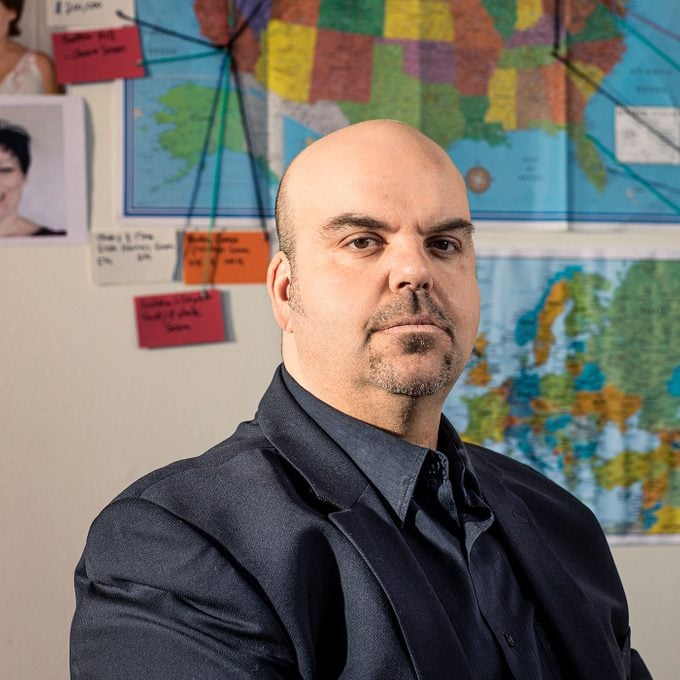My Best Friend Scammed Me Out of $92,000, Forcing Me into Bankruptcy
Updated: May 09, 2023

She swindled me out of $92,000, forcing me into bankruptcy and destroying my once sunny outlook. But I finally got justice.
I fell hard for one of the oldest cons in the book. But this scheme wasn’t cooked up by some fictional Nigerian prince soliciting me through a sketchy e-mail. I fell under the spell of an immensely lovable woman who inserted herself into my life and became my best friend. She was also an international con artist on the run.
She snared me in an age-old con called the Inheritance Scam, ultimately bilking me out of nearly $100,000. She simultaneously destroyed my sense of self and darkened my once joyful outlook. As she was ruining my life, she was also scamming dozens of others around the world by impersonating psychics, mortgage brokers, psychologists, lawyers, and travel agents and even pretending to be a cancer victim.
She was a true queen of the con, using disguises and plastic surgery to alter her appearance. I was a reality TV producer, working on shows such as American Ninja Warrior and Shark Tank, and I never saw through her masterful performances. She might have gotten away with cheating many more people if she hadn’t turned me into a vigilante. I started my own investigation, uncovered other victims, and helped bring her to justice.
Today, she’s in jail, probably wondering how on earth she became the victim of one of her own victims. Make sure you know about these phone call scams that could steal your money.
Allow me to explain.
She introduced herself to me as Mair Smyth in May 2013, when she joined a group of angry neighbors in my living room to discuss what to do about losing access to our building’s swimming pool because of a legal spat with a neighboring building.
“I can help,” she told us. “My boyfriend is a lawyer who can get the pool back!”
I liked her immediately. We all did. She was brash. Funny. Intelligent and outspoken. Ironically, for someone who turned out to be a liar and a con artist, she came across as a woman who would always “tell it like it is.”
She also came across as extremely wealthy. She wore expensive Jimmy Choo shoes and once showed me her closet filled with more than 250 pairs. I later discovered they were all fake.

After our initial meeting in my apartment that night, Mair invited my husband, Pablito, and me to dinner. Over the next year, she frequently wined and dined us at fancy restaurants and always insisted on picking up the bill. “I have a lot of money—let me pay!” she’d plead convincingly.
We’d hang out almost every evening in our barbecue area, exchanging intimacies under the cool Los Angeles sky. Mair told us she was originally from Ireland. One night she pointed to a framed document hanging in her living room. “This is the Irish Constitution,” she said.
“See that signature at the bottom? That’s my great-uncle’s.” I had no idea that, like her shoes, that tale was fake.
Mair brought me Irish tea and pastries and regaled me with stories of how when she was a young girl, her grandmother, who was supposedly in the Irish Republican Army, would take her to the top of a bridge and teach her how to hurl Molotov cocktails down on British soldiers. I was captivated and horrified.
When I tearfully confided in her that part of my family had disowned me for being gay, she pounced. “My family disowned me, too!” she said as she fought back tears. “They’re trying to get me disinherited.”
Mair told me that an uncle, the patriarch of her family, had recently died, and her cousins were dividing up an estate worth 25 million euros (about $32 million). She said she was supposed to receive 5 million euros as her share of the inheritance and showed me angry text messages and e-mails from her cousins threatening that she wouldn’t get a dime.
Mair told me she had taken a lot of family money with her when she left Ireland many years ago, so she never needed to work. But she claimed she enjoyed working, so she got hired at a travel agency where her family did a lot of business. Watch out for these sneaky “deals” that are actually money scams.
 Fourteen months into our friendship, Mair and I were like sister and brother, even ending our phone calls with “I love you.” She told me that her barristers (I had to look up the word to learn that it means “lawyers”) were having trouble trying to secure her inheritance and that they had warned her about a clause in her uncle’s will stating that if any family member were convicted of a felony, the person would forfeit his or her share.
Fourteen months into our friendship, Mair and I were like sister and brother, even ending our phone calls with “I love you.” She told me that her barristers (I had to look up the word to learn that it means “lawyers”) were having trouble trying to secure her inheritance and that they had warned her about a clause in her uncle’s will stating that if any family member were convicted of a felony, the person would forfeit his or her share.
“You’d better be careful!” I cautioned her. “One of your disgruntled cousins might try and set you up!” Many of her family members certainly appeared to hate her. Why wouldn’t they set her up? I thought.
On July 8, 2014, my phone rang.
“You have a collect call from an inmate at the Century Regional Detention Facility. Press one to accept,” the computerized voice instructed me.
It was Mair. I quickly pressed one.
“You were right!” she sobbed. “I was arrested today. My family set me up to make it look like I stole $200,000 from my job.”
“I told you this would happen!” I yelled. I was distraught. I found a bail bondsman and paid him $4,200 to get her out of jail. That’s when I first learned that her legal name was Marianne Smyth, not Mair Smyth. But she paid me back the next day, when she was released from jail. Or, rather, the married man she was dating at the time paid me back. Little did I (or he) know she was scamming him too.
As the months passed, Mair showed me e-mails from her lawyers assuring her that the case against her was falling apart. I had no idea those e-mails were from fake accounts she had created herself, just like the messages she claimed were from her cousins. These are the signs that an Amazon seller can’t be trusted.
Then, almost three years into our friendship, she told me that the district attorney prosecuting her case had frozen her bank accounts. So I started lending her money. She had immediately paid back the $4,200 I used to bail her out of jail, so I felt confident she’d pay me back any other money I loaned her.
But that’s the thing: The term con artist is short for confidence artist because these individuals are skilled at gaining your confidence and then using it to scam you out of your money.
Over the course of several months, I lent Mair nearly $15,000. You’d think I’d be worried about giving her that much money, but I wasn’t. Not only was she my best friend, but she also claimed she was about to inherit millions of dollars. I never even considered that anything sinister could be taking place. Make sure you stop falling for these common Facebook scams.

One day, Mair called me and said the DA was demanding $50,000 to dismiss the case against her. I didn’t have $50,000 in cash. But I did have an 840 credit score. So I let her charge the $50,000 on my credit cards to get the criminal case against her dropped.
A few months later, Mair was arrested again. She said the judge had charged her with money laundering, something to do with her using my credit cards, and punished her with 30 days in jail—a “slap on the wrist.” She assured me, once again, that as soon as she got out and received her inheritance, she would pay me back.
Mair called me collect from jail every day. When I said I wanted to come visit her, she begged me not to. “I don’t want you to see me like this,” she said. But I insisted. So I logged on to the jail’s website to schedule a visit. That’s when the true devastation she had wrought on my life started to reveal itself.
The website showed that Mair was serving time for felony grand theft. This was no slap on the wrist.
I took the day off and rushed to a Los Angeles courthouse. With trembling hands, I reviewed every record I could find from Mair’s case. I discovered she had lied to me about everything. I suddenly couldn’t breathe.
I learned that the $50,000 I let her charge on my credit cards had gone to pay $40,000 as part of a plea agreement to a felony grand theft charge she faced for stealing more than $200,000 from the travel agency she worked for. Had she not been able to come up with that $40,000, she would have received a five-year jail sentence, not the measly 30 days she actually served.
Her bank accounts had never been frozen. There was no wealthy Irish family or inheritance. She’s not even Irish! Those were all lies she used to entrap me.
I went home and collapsed in my husband’s arms. “How could I let this happen to us?” I sobbed.
Eventually, my pain was replaced by breathtaking anger and the determination to do something. Here are the online scams you need to be aware of—and how to avoid them.

The day Mair was released from jail, I confronted her in the parking lot outside our apartment building. She denied everything. “That’s not true, Johnathan! That’s not true!” she protested as tears streamed down her face.
But I was done believing anything she had to say. I balled up my fists, clenched my jaw, and walked away. We never spoke again.
I went to the police days later, in March 2017, and filed a report. The officer interviewing me seemed skeptical that there was anything they could do. “Don’t give strangers your money” were his parting words. So I started my own investigation.
I dug up Mair Smyth’s high school yearbook and learned that she was born Marianne Andle in Maine and graduated from Bangor High in 1987. She later moved to Tennessee, where, according to estranged family members I spoke with, she claimed she had breast cancer and allegedly scammed friends and neighbors out of thousands for “treatments.” They told me Mair was oddly obsessed with wanting to be Irish. In 2000, she went to Ireland on vacation. She ended up marrying a local and stayed for nine years.
In the same way that wooden stakes kill vampires and silver bullets kill werewolves, publicity kills con artists. I began turning my pain into a profound sense of purpose. I started a blog, johnathanwalton.com, detailing how Mair had scammed me. Soon, other victims of hers from all over the world started reaching out.
I heard from one who claimed Mair had scammed her out of $10,000 by impersonating a psychologist. She allegedly tricked our landlord out of $12,000 in rent by pretending to have cancer. Mair had iron-deficiency anemia and would purposely avoid iron-rich foods so she could get admitted into hospitals for iron infusions. While sitting in a hospital bed, she’d ask a nurse to take her picture and then e-mail that photo to her victims to better sell her cancer story. She used this particular scam a lot.
A police detective in Northern Ireland told me that authorities in Belfast had been looking for Marianne Smyth for years. The detective said she had worked as a mortgage broker in 2008 and had scammed many people and then vanished.
All in all, Mair Smyth used at least 23 different aliases and has been charged with fraud and grand theft in Florida and Tennessee.
I was determined to get justice and called the Los Angeles Police Department every day.
 A year after I’d last seen her, Mair was arrested and charged with grand theft for scamming me. She was released on her own recognizance. I never went near her, but one month before trial, Mair filed for a restraining order against me, asserting that I was threatening her with violence. It cost me $1,500 to hire an attorney to fight her bogus claim. “If a judge grants the restraining order, you would be prevented from testifying against her at her criminal trial,” my lawyer explained.
A year after I’d last seen her, Mair was arrested and charged with grand theft for scamming me. She was released on her own recognizance. I never went near her, but one month before trial, Mair filed for a restraining order against me, asserting that I was threatening her with violence. It cost me $1,500 to hire an attorney to fight her bogus claim. “If a judge grants the restraining order, you would be prevented from testifying against her at her criminal trial,” my lawyer explained.
Could this be her checkmate move? I wondered. I was apoplectic.
Thankfully, the judge refused to grant the restraining order, and Mair’s trial proceeded. The prosecution presented a mountain of irrefutable evidence. Though she was charged with scamming only me, the judge allowed testimony from three other victims to demonstrate a pattern.
Mair did not testify in her own defense. As witnesses described how she had scammed them, she just sat there with an emotionless look on her face. That was probably her biggest tell to the jury. She was a brilliant actress while she was conning people, but remarkably, she didn’t know how to act innocent.
The only defense her attorney had was that I was making the whole story up. Supposedly I had persuaded all of the other witnesses—people I didn’t even know before Mair scammed me—to lie under oath. He was terrifyingly convincing.
The prosecutor went over in extreme detail each dollar Mair had scammed from me. Reliving that experience in front of a roomful of strangers ignited fury and embarrassment and regret in a new, painful way.
I spent two years pursuing Marianne Smyth. I had to file for bankruptcy because of what she had done to me. And the 24 court appearances I made even before the trial—for continuances, pretrial motions, and hearings—meant I missed a lot of work and lost even more money. Not to mention the cost of hiring private investigators in multiple states and countries to ferret out all her scams.
But it was worth it.
On January 9, 2019, Marianne Smyth was found guilty of conning me out of $91,784—the money she had borrowed plus thousands of dollars of interest that had accrued on my credit cards. She was sentenced to five years behind bars.
Besides me, only two of Mair’s other marks reported her to the police. That enabled her to continue scamming people for years. Most of her victims, like most victims of any con artist, were too ashamed to tell anyone what had happened to them.
I am now suspicious of everyone and everything. Making new friends is not something I’m good at anymore. And I’m ashamed too. But my desire to stop her from hurting other people is much stronger than my shame. Next, learn about the most common eBay scams you need to watch out for.













